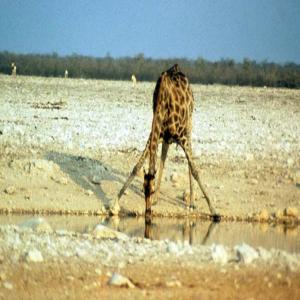
Stephanie Vergniault, Founder and Executive Director of SOS Elephants, talks about elephant poaching in Chad. She tells “The WildLife” host Laurel Neme that the situation is spiraling out of control. In just two-weeks, in February 2011, 20 elephants were killed in Chad for their ivory. All were killed outside of protected areas, making them easy targets. Vergniault notes that if poaching continues at this rate, “not a single elephant will be alive in Chad in three years time.”
Vergniault is doing all she can to stop this trend. For example, SOS Elephants has developed a network of 100 to 200 local people who inform the NGO about poaching activity, including providing positions of poachers or elephants. It then can alert Chadian government forces, (namely Mobile Forces of Protection of the Environment,) about the incidents. In fact, in mid-March 2011, government forces apprehended the poachers involved in the February incident. They also seized AK-47s, horses and 15 ivory tusks.
While in some regions tourism might provide an economic alternative, in Chad the prospects are limited because the elephants there have become so aggressive and often charge at people. “They are used to poachers,” Vergniault explains. “They have a good memory. To them, humans are bad.” As a result, SOS Elephants focuses on education and training in rural areas, discussing non-lethal alternatives, such as solar barriers or red pepper to discourage elephants from raiding crops and planting outside of elephant migration corridors. Vergniault knows that changing public attitudes both towards elephants and towards ivory is the only way to stop the killing, so SOS Elephants also spreads the word through sport. It’s NGO-sponsored soccer team, The Elephants, serves as an ambassador for the real elephants, furthering the message. It’s working, as more and more local teams are springing up spontaneously across the country.
Stephanie Vergniault is the founder and Executive Director of SOS Elephants in Chad. As a French lawyer specializing in elections and governance, she became passionate about her work overseas and traveled around the world to work in places like Nicaragua, Venezuela, the Democratic Republic of Congo, Burundi, Ethiopia, Gabon, and Chad. She first came to Chad in 1995 to work with the government on electoral assistance. At that time, as a guest of the Head of State, she had a desire to see the elephants and was struck by their dire situation. When she returned in 2007, she was shocked by the massive slaughter that was occurring. That’s when she decided to take action and, in 2009, Stephanie created the non-governmental organization in Chad called SOS Elephants. SOS Elephants is dedicated to the preservation of elephants and their habitats in Chad and its neighbors. It works through a combination of methods including research, education, conservation and counter poaching actions. Vergniault now lives in Chad and works closely with local communities. One of the newest projects Stephanie has undertaken is building an elephant orphanage for the baby elephants who are orphaned after their mothers are poached for their ivory. This episode of “The WildLife” aired on The Radiator, WOMM-LP, 105.9 FM in Burlington, Vermont on April 11, 2011.
More Episodes
 2013-02-24
2013-02-24
 813
813
 2013-02-21
2013-02-21
 1.3k
1.3k
 2011-10-03
2011-10-03
 1.8k
1.8k
 2011-09-19
2011-09-19
 1.3k
1.3k
 2011-09-11
2011-09-11
 1.7k
1.7k
 2011-08-29
2011-08-29
 1.3k
1.3k
Create your
podcast in
minutes
- Full-featured podcast site
- Unlimited storage and bandwidth
- Comprehensive podcast stats
- Distribute to Apple Podcasts, Spotify, and more
- Make money with your podcast
It is Free
- Privacy Policy
- Cookie Policy
- Terms of Use
- Consent Preferences
- Copyright © 2015-2024 Podbean.com





